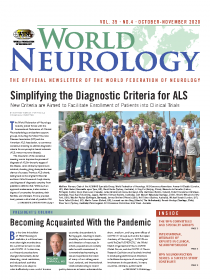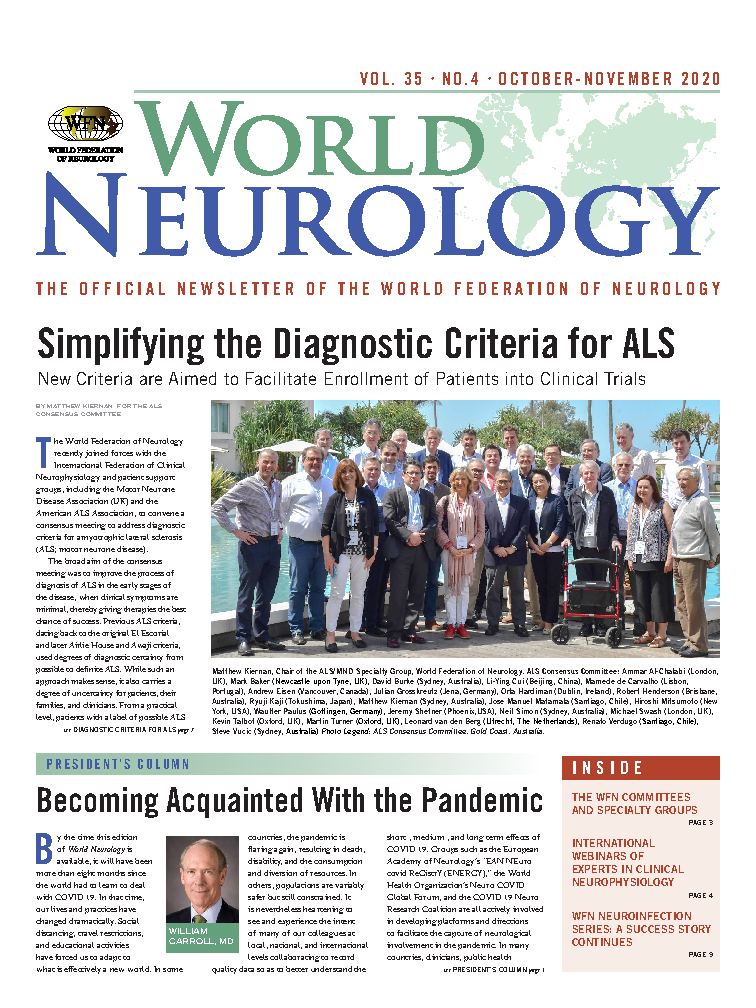Document Download: World Neurology: October-November 2020

Description:
World Neurology: October-November 2020, Volume 35, No. 4
Published: 9 Nov 2020
Published by Ascend Integrated Media LLC, Kansas, USA
From the editors
Steven L. Lewis, MD, Editor, and Walter Struhal, MD, Co-Editor


 This issue begins with the report from Matthew Kiernan for the ALS Consensus Committee, operating with the support of the WFN, about the development and publication of the new ALS diagnostic criteria, which are aimed to diminish ambiguity of patients' diagnoses while also facilitating enrollment of patients into clinical trials. In this issue's President's Column, WFN President William Carroll reports on the current global efforts to understand, collaborate, and report on the neurologic aspects of COVID-19 and also updates us on the recent Annual General Meeting of the Council of Delegates, the success of the recent World Brain Day 2020, and recent and current successful efforts related to virtual education in the current era from the WFN, the national societies, and WFN specialty groups. In his recurring column on the WFN Committees and Specialty Groups, WFN Secretary-General Wolfgang Grisold updates us on the activities of the WFN Congress Committee and the WFN Specialty Group on Rare Neurologic Diseases.
This issue begins with the report from Matthew Kiernan for the ALS Consensus Committee, operating with the support of the WFN, about the development and publication of the new ALS diagnostic criteria, which are aimed to diminish ambiguity of patients' diagnoses while also facilitating enrollment of patients into clinical trials. In this issue's President's Column, WFN President William Carroll reports on the current global efforts to understand, collaborate, and report on the neurologic aspects of COVID-19 and also updates us on the recent Annual General Meeting of the Council of Delegates, the success of the recent World Brain Day 2020, and recent and current successful efforts related to virtual education in the current era from the WFN, the national societies, and WFN specialty groups. In his recurring column on the WFN Committees and Specialty Groups, WFN Secretary-General Wolfgang Grisold updates us on the activities of the WFN Congress Committee and the WFN Specialty Group on Rare Neurologic Diseases.
In this issue's history section, Aernoud T.L. Fiolet and Ingrid M. Daey Ouwens describe the history of malaria fever therapy as a treatment for general paralysis of the insane from neurosyphilis, which they provide as a cautionary tale in the current pandemic era with regard to potential pitfalls in urgently developed treatments. Also in this issue, Gustavo Roman, who was recently appointed as editor-in-chief of Cerebral Circulation, issues a call for papers for this new publication.
This issue is distinguished by having a number of articles highlighting a sampling of some of our member societies' successes related to World Brain Day 2020, including the report from India from Chandrashkhar Meshram, Pramod Kumar Pal, Gagandeep Singh, Nirmal Surya, and Vinay Goyal; a report from Pakistan by Abdul Malik; a report from Man Mohan Mehndiratta and colleagues from New Delhi on his suggestions for a successful virtual advocacy effort; and finally, a report by Marcelle Smith and Patty Francis on the current status of Parkinson's Disease in Africa, particularly from their South African perspective.
Much of the remainder of this issue is devoted to the important new world of international virtual conferences related to the WFN, in addition to the recent very successful AFAN/WFN E-Learning Day, which was held on Oct. 10 and so skillfully led by Riadh Gouider, WFN Trustee, and discussed in the President's column. This issue features reports from Abderrahmane Chahidi, Zouhayr Souirti, Mohamed Chraa, Najib Kissani, and Reda Ouazzani from the Moroccan Society of Neurophysiology and Moroccan League Against Epilepsy on their highly attended and successful International Webinars of Experts in Clinical Neurophysiology, and the report by Chandrashkhar Meshram on the WFN Neuroinfection Series (cosponsored by the Forum for Indian Neurology Education [FINE]) that is now on its second set of highly attended and remarkable lectures and case presentations on neuroinfectious disease. These internationally presented and globally attended lecture series represent highly effective and (and in these cases, free) educational efforts; in fact, the creation of these remarkable online (live and archived) educational opportunities are the true silver linings of the current pandemic and we encourage neurologists worldwide to attend and learn from as many of these virtual lecture series as possible.
On a similar note, John England, Wolfgang Grisold, and Juan J. Vilchez report on the recent International Congress on Neuromuscular Diseases (ICNMD), which was both highly successful and well attended in its virtual format for 2020.
Finally, the issue concludes with a heartfelt report from Guillermo Delgado- García, who details his visit to "The Neuro" (the Montreal Neurological Institute) under the auspices of the WFN and the Canadian Neurological Society. •
Highlights
President's Column
- Becoming Acquainted With the Pandemic
By Prof. William Carroll
By the time this edition of World Neurology is available, it will have been more than eight months since the world had to learn to deal with COVID-19. In that time, our lives and practices have changed dramatically.
The WFN Committees and Speciaty Groups
- The WFN Congress Committee and Specialty Group on Rare Neurologic Diseases
By Wolfgang Grisold
This column is intended to explain the work of the WFN committees and specialty groups. All WFN committees and specialty groups are listed on the website for further information. The committees are essential parts of the WFN management and have specific duties to support activities of the WFN.
From WFN
- WFN Neuroinfection Series: A Success Story Continues
By Dr Chandrashekhar Meshram
The Tropical and Geographical Neurology Specialty Group of the World Federation of Neurology, in collaboration with the Forum for Indian Neurology Education (FINE), organized a neuroinfection webinar series held every Saturday from July 18 to Sept. 5. It was first educational activity of its kind by a WFN specialty group.
- International Conference Report: International Congress on Neuromuscular Diseases (ICNMD) Went Digital for 2020
By John D. England, Wolfgang Grisold and Juan J. Vilchez
The COVID-19 pandemic has disrupted almost everything, including international meetings. ICNMD 2020, which was scheduled to take place in Valencia, Spain, in July 2020, was cancelled because of global travel restrictions. The unprecedented situation necessitated the development of new strategies for holding the meeting.
Around the World
- Simplifying the Diagnostic Criteria for ALS
By Matthew Kiernan, for the Als Consensus Committee
The World Federation of Neurology recently joined forces with the International Federation of Clinical Neurophysiology and patient support groups, including the Motor Neurone Disease Association (UK) and the American ALS Association, to convene a consensus meeting to address diagnostic criteria for amyotrophic lateral sclerosis (ALS; motor neurone disease).
- New Paths of Sharing Science for Neurology Education in the Era of the COVID-19 Pandemic
By Abderrahmane Chahidi, Zouhayr Souirti, Mohamed Chraa, Najib Kissani, Reda Ouazzani Moroccan Society of Neurophysiology & Moroccan League Against Epilepsy, Morocco.
Health care innovation, notably in clinical neurology and neurophysiology, has been rapidly growing over the last few decades, both in terms of therapy and diagnosis. Hence, it is necessary to spread and share information along the various possible paths.
- Call for Papers
By Gustavo Roman, MD
I have recently been appointed editor-inchief of a new Elsevier online publication, Cerebral Circulation - Cognition and Behavior. The goal is to publish papers dealing with the arterial, venous, CSF, and glymphatic circulation and cognitive or behavioral aspects.
World Brain Day 2020
- 7 Lessons Learned From Janakpuri Super Speciality Hospital Society in New Delhi, India Steps to Creating a Virtual Public Awareness Event for Neurological Diseases in an Era of Social Distancing
By Dr. Man Mohan Mehndiratta, Dr. Amrita Tiwary Vyas, Dr. Natasha Singh Gulati, Dr. Yogesh Sharma, and Durgesh Kumar Pathak
Lessons Learned From Janakpuri Super Speciality Hospital Society in New Delhi, India
- World Brain Day Celebration in India
By Chandrashekhar Meshram, Pramod Kumar Pal, Gagandeep Singh, Nirmal Surya, Vinay Goyal
The theme of this year's World Brain Day, "move together to end Parkinson's disease," is very relevant for patients, their caregivers, family physicians, and the general public, and therefore there was a lot of excitement about the event. World Brain Day was cerebrated throughout India on July 22. Due to the COVID-19 pandemic, auditorium or field programs could not be organized, so the campaign was mainly through print and electronic media with virtual meetings in different cities of the country.
- Move Together to End Parkinson's Disease: World Brain Day 2020
By Dr Abdul Malik MD
The World Federation of Neurology (WFN) promotes brain health through its education, skills development, and advocacy activities. Since 2014, the WFN has organized dedicated awareness drives in all the WFN member countries around the globe.
- Parkinson's Disease in Africa: A South African Perspective (A Report in Relation to World Brain Day 2020)
By Dr Marcelle Smith and Dr Patty Francis
The African continent has been experiencing rapid changes in recent decades, with increases in life expectancy. The average healthy life expectancy increased from 46.1 years in 1990 to 55.2 in 2017. This is still far below the average life expectancy in high-income countries of over 70 years. However, this has been sufficient to increase the burden of age-related and neurodegenerative conditions such as Parkinson's Disease (PD).
WFN Department Visit
- A Great Time at The Neuro (My Report of the Canadian Department Visit Program (2019)
By Guillermo Delgado-García, MD
A snowy Montréal received me on a Saturday in mid-November; the previous morning I sat my annual examination and then I was there—3,700 kilometers from Mexico City.
History
- Treatment Evaluation Takes Time - A Cautionary Tale From the History of Malaria Fever Therapy
By Aernoud T.L. Fiolet and Ingrid M. Daey Ouwens
History is the present seen through the eyes of the future. Now, more than ever, we are confronted with this aphorism, as one of the most impressive contemporary pandemics unrolls. As of mid-October 2020, according to the WHO (https:// www.who.int/emergencies/diseases/ novel-coronavirus-2019), more than 39 million cases have been confirmed worldwide, including more than 1 million deaths.







